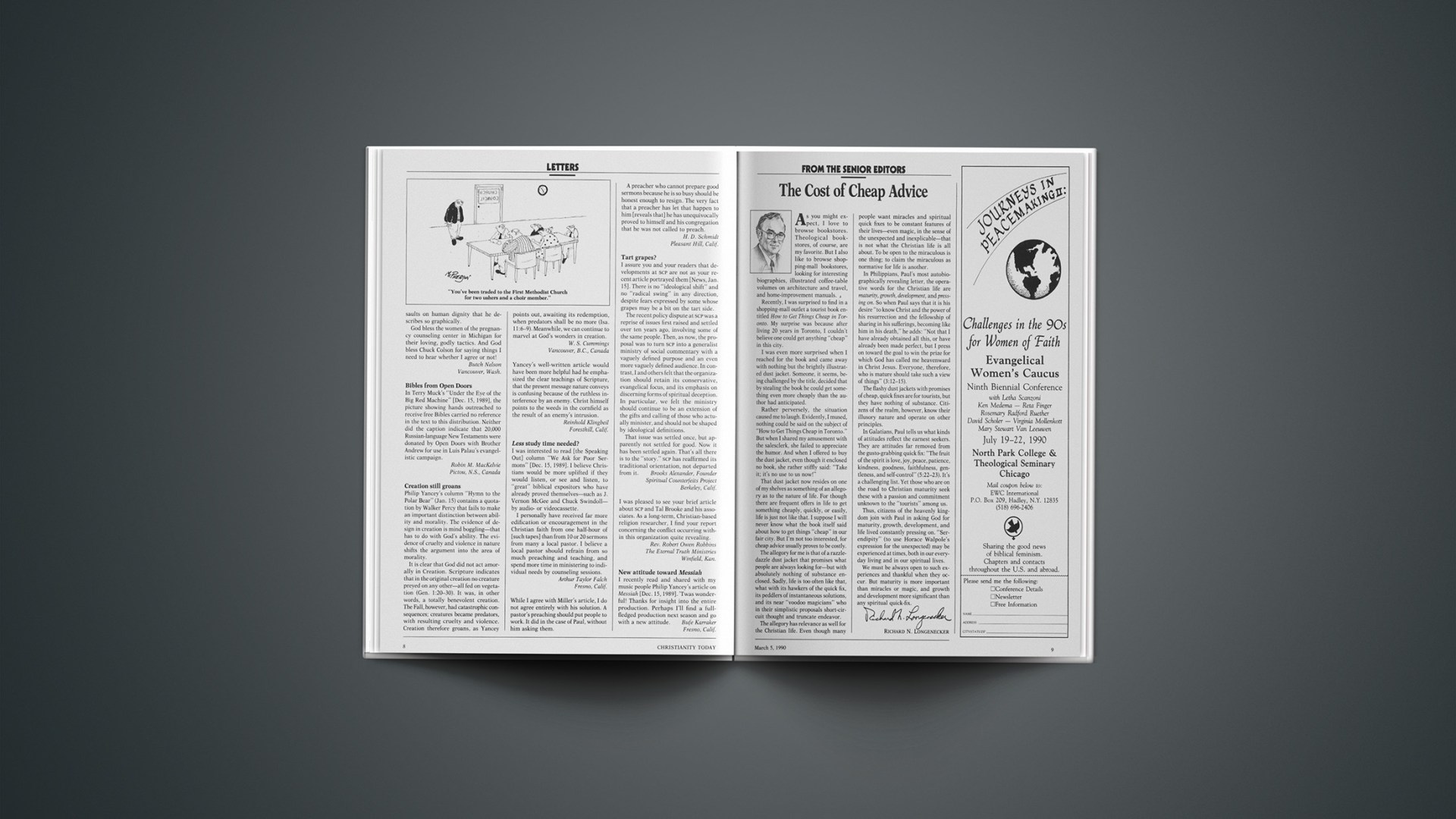As you might expect, I love to browse bookstores. Theological bookstores, of course, are my favorite. But I also like to browse shopping-mall bookstores, looking for interesting biographies, illustrated coffee-table volumes on architecture and travel, and home-improvement manuals.
Recently, I was surprised to find in a shopping-mall outlet a tourist book entitled How to Get Things Cheap in Toronto. My surprise was because after living 20 years in Toronto, I couldn’t believe one could get anything “cheap” in this city.
I was even more surprised when I reached for the book and came away with nothing but the brightly illustrated dust jacket. Someone, it seems, being challenged by the title, decided that by stealing the book he could get something even more cheaply than the author had anticipated.
Rather perversely, the situation caused me to laugh. Evidently, I mused, nothing could be said on the subject of “How to Get Things Cheap in Toronto.” But when I shared my amusement with the salesclerk, she failed to appreciate the humor. And when I offered to buy the dust jacket, even though it enclosed no book, she rather stiffly said: “Take it; it’s no use to us now!”
That dust jacket now resides on one of my shelves as something of an allegory as to the nature of life. For though there are frequent offers in life to get something cheaply, quickly, or easily, life is just not like that. I suppose I will never know what the book itself said about how to get things “cheap” in our fair city. But I’m not too interested, for cheap advice usually proves to be costly.
The allegory for me is that of a razzle-dazzle dust jacket that promises what people are always looking for—but with absolutely nothing of substance enclosed. Sadly, life is too often like that, what with its hawkers of the quick fix, its peddlers of instantaneous solutions, and its near “voodoo magicians” who in their simplistic proposals short-circuit thought and truncate endeavor.
The allegory has relevance as well for the Christian life. Even though many people want miracles and spiritual quick fixes to be constant features of their lives—even magic, in the sense of the unexpected and inexplicable—that is not what the Christian life is all about. To be open to the miraculous is one thing; to claim the miraculous as normative for life is another.
In Philippians, Paul’s most autobiographically revealing letter, the operative words for the Christian life are maturity, growth, development, and pressing on. So when Paul says that it is his desire “to know Christ and the power of his resurrection and the fellowship of sharing in his sufferings, becoming like him in his death,” he adds: “Not that I have already obtained all this, or have already been made perfect, but I press on toward the goal to win the prize for which God has called me heavenward in Christ Jesus. Everyone, therefore, who is mature should take such a view of things” (3:12–15).
The flashy dust jackets with promises of cheap, quick fixes are for tourists, but they have nothing of substance. Citizens of the realm, however, know their illusory nature and operate on other principles.
In Galatians, Paul tells us what kinds of attitudes reflect the earnest seekers. They are attitudes far removed from the gusto-grabbing quick fix: “The fruit of the spirit is love, joy, peace, patience, kindness, goodness, faithfulness, gentleness, and self-control” (5:22–23). It’s a challenging list. Yet those who are on the road to Christian maturity seek these with a passion and commitment unknown to the “tourists” among us.
Thus, citizens of the heavenly kingdom join with Paul in asking God for maturity, growth, development, and life lived constantly pressing on. “Serendipity” (to use Horace Walpole’s expression for the unexpected) may be experienced at times, both in our everyday living and in our spiritual lives.
We must be always open to such experiences and thankful when they occur. But maturity is more important than miracles or magic, and growth and development more significant than any spiritual quick-fix.










